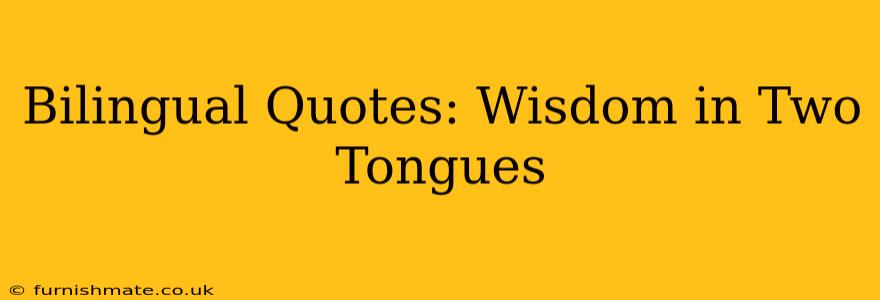The beauty of language lies not just in its ability to communicate, but in its capacity to express nuanced emotions, perspectives, and wisdom. Bilingual individuals often find themselves bridging cultures and understanding the world through two distinct lenses. This unique perspective is often reflected in the quotes they choose, those gems of wisdom that resonate across linguistic boundaries. This exploration delves into the fascinating world of bilingual quotes, showcasing the power of words in multiple languages and the insightful perspectives they offer.
Why are Bilingual Quotes so Powerful?
The power of a bilingual quote stems from its ability to encapsulate a concept in two distinct yet complementary ways. The subtle differences in meaning, emphasis, and even tone between languages can enrich the overall understanding and impact of the quote. It's like seeing a multifaceted gem, each facet revealing a new shade of meaning. This dual expression allows for a deeper understanding and appreciation of the original sentiment, transcending the limitations of a single language.
Famous Bilingual Quotes and their Interpretations
Let's explore some examples of famous bilingual quotes and unpack their dual meanings:
-
"A bird doesn't sing because it has an answer, it sings because it has a song." - (English) "Un oiseau ne chante pas parce qu'il a une réponse, il chante parce qu'il a une chanson." (French) This quote, often attributed to various sources, highlights the inherent beauty of expression regardless of a need for external validation. The French translation maintains the lyrical quality and emphasizes the inherent, almost instinctual, nature of artistic expression.
-
"El que busca encuentra." (Spanish) - "He who seeks finds." (English) This proverb, simple yet profound, illustrates the universal truth that perseverance leads to discovery. The Spanish version carries a more direct, almost forceful tone, while the English translation retains the inspirational and hopeful sentiment.
-
"Hakuna Matata" (Swahili) - "No worries" (English) This famous phrase from The Lion King beautifully demonstrates the power of a concise expression. While "Hakuna Matata" directly translates to "no worries," it encapsulates a whole philosophy of carefree living.
What Makes a Good Bilingual Quote?
Several factors contribute to the effectiveness of a bilingual quote:
-
Accuracy of Translation: A good bilingual quote requires a precise and nuanced translation that captures not just the literal meaning but also the tone, style, and cultural context of the original.
-
Complementary Meanings: The two languages should complement each other, offering subtly different perspectives or nuances that enrich the overall meaning.
-
Cultural Significance: The quote should ideally hold significance in both cultures represented, allowing for a deeper appreciation of the shared human experience.
How to Find and Use Bilingual Quotes
Finding inspiring bilingual quotes can be a rewarding experience. You can:
- Explore Literature and Poetry: Dive into works translated from different languages, paying close attention to the nuances of the translation.
- Use Online Resources: Several websites and databases specialize in collecting proverbs and quotes from various languages.
- Engage with Bilingual Communities: Connect with individuals who are fluent in multiple languages to gain insights and discover hidden gems.
Frequently Asked Questions
What is the benefit of using bilingual quotes?
Using bilingual quotes adds depth, richness, and cultural awareness to any context. They appeal to a wider audience and offer a more profound understanding of the message being conveyed. They're ideal for presentations, social media posts, and any situation where you want to express a meaningful idea with impact.
Where can I find more bilingual quotes?
You can find bilingual quotes through online searches, bilingual literature, and by engaging with bilingual communities online and offline.
How can I use bilingual quotes effectively?
Always ensure accuracy in translation and understand the cultural context of the quote. Use them sparingly and thoughtfully, to maximize their impact and avoid diluting their meaning. Context is key; ensure the quote aligns with your overall message.
By exploring the world of bilingual quotes, we not only appreciate the beauty of language but also gain a deeper understanding of human experience and wisdom, expressed through the rich tapestry of different tongues.

